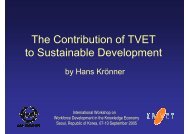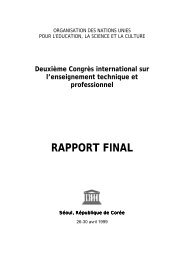Learning for Life, Work and the Future Initial ... - Unesco-Unevoc
Learning for Life, Work and the Future Initial ... - Unesco-Unevoc
Learning for Life, Work and the Future Initial ... - Unesco-Unevoc
Create successful ePaper yourself
Turn your PDF publications into a flip-book with our unique Google optimized e-Paper software.
Page 56 Participants’ Papers <strong>Learning</strong> <strong>for</strong> <strong>Life</strong>, <strong>Work</strong> <strong>and</strong> <strong>the</strong> <strong>Future</strong><br />
<strong>the</strong> participation of both genders in technical <strong>and</strong><br />
vocational skills programmes.<br />
2. TVET in <strong>the</strong> Seychelles be<strong>for</strong>e <strong>the</strong><br />
1999 Education Re<strong>for</strong>m<br />
Technical Vocational Education <strong>and</strong> Training (TVET)<br />
in <strong>the</strong> Seychelles was carried out under <strong>the</strong> Ministry of<br />
Education <strong>and</strong> Culture at <strong>the</strong> Seychelles Polytechnic.<br />
Ano<strong>the</strong>r approach to <strong>the</strong> implementation of TVET,<br />
which was being gradually implemented, was <strong>the</strong><br />
introduction of a two-tier system in <strong>the</strong> third year of<br />
secondary education which incorporates academic <strong>and</strong><br />
vocational programmes.<br />
The Seychelles Polytechnic was a hybrid tertiary institution<br />
with a very clear brief to cater <strong>for</strong> all technical<br />
vocational education <strong>and</strong> training according to manpower<br />
needs, as projected from a highly centralised<br />
planning perspective. Pre-employment craft <strong>and</strong> technician<br />
courses were offered on a full-time basis<br />
following <strong>the</strong> City <strong>and</strong> Guilds of London Institute<br />
(C&G) syllabus.<br />
The process of maintaining st<strong>and</strong>ards took various<br />
<strong>for</strong>ms depending on traditional practices. External<br />
examination bodies such as UCLES, C&G <strong>and</strong> <strong>the</strong><br />
Pitman’s Institute have been used to moderate<br />
st<strong>and</strong>ards in some schools. Consultancies have led to<br />
curriculum revisions in o<strong>the</strong>rs, while linkage schemes<br />
have not only made possible staff <strong>and</strong> student exchanges<br />
between institutions, but have also enhanced<br />
significantly <strong>the</strong> quality of some training programmes.<br />
The C&G syllabi used were st<strong>and</strong>ard prescriptions <strong>and</strong><br />
not necessarily targeted to <strong>the</strong> needs of <strong>the</strong> labour<br />
market. The full-time pattern of attendance made <strong>the</strong><br />
courses predominantly <strong>the</strong>oretical <strong>and</strong>, as a result,<br />
employers complained that <strong>the</strong> courses did not meet<br />
<strong>the</strong> skill levels needed <strong>for</strong> effective job per<strong>for</strong>mance.<br />
3. Issues Affecting TVET<br />
The issues affecting TVET in <strong>the</strong> Seychelles were<br />
typical of problems faced by most developing<br />
countries, compounded by <strong>the</strong> transitory nature of <strong>the</strong><br />
economy. These included:<br />
• inadequate institutional framework<br />
• mismatch between supply <strong>and</strong> dem<strong>and</strong><br />
• lack of relevance<br />
• inefficiency, ineffectiveness<br />
• inappropriate curricula <strong>and</strong> approach<br />
• inadequate financial provision <strong>for</strong> training.<br />
4. The 1999 Education Re<strong>for</strong>m<br />
As part of this re<strong>for</strong>m, most of <strong>the</strong> Polytechnic’s<br />
Schools, <strong>the</strong>n under <strong>the</strong> Ministry of Education, went to<br />
<strong>the</strong>ir respective Ministries. The Schools of Agriculture<br />
<strong>and</strong> Maritime Studies were transferred to <strong>the</strong> Ministry<br />
of Agriculture <strong>and</strong> Marine Resources; <strong>the</strong> School of<br />
Art <strong>and</strong> Design to <strong>the</strong> Ministry of Culture; <strong>the</strong> Hotel<br />
School went to <strong>the</strong> Ministry of Tourism; <strong>and</strong>, finally,<br />
<strong>the</strong> School of Health Studies went to <strong>the</strong> Ministry of<br />
Health. The re<strong>for</strong>m also brought about <strong>the</strong> creation of<br />
a new Industrial Training Centre to provide occupational<br />
trade programmes <strong>for</strong> <strong>the</strong> construction <strong>and</strong><br />
engineering industries. The Polytechnic only kept <strong>the</strong><br />
Schools of Business Studies, Humanities <strong>and</strong> Science,<br />
<strong>and</strong> Technical Studies, <strong>and</strong> today operates with a m<strong>and</strong>ate<br />
to provide advanced courses at diploma level.<br />
The creation of a new division in <strong>the</strong> Ministry of Education,<br />
<strong>the</strong> Technical <strong>and</strong> Fur<strong>the</strong>r Education Division,<br />
to implement new policies <strong>and</strong> strategies, is again<br />
ano<strong>the</strong>r sign of Government commitment to enhance<br />
<strong>the</strong> development of TVET in <strong>the</strong> country.<br />
The principle reasons <strong>for</strong> <strong>the</strong> re<strong>for</strong>m <strong>and</strong> <strong>the</strong> decentralization<br />
of training were principally to improve<br />
<strong>the</strong> quality of training provided by <strong>the</strong> different training<br />
institutions <strong>and</strong> to increase access to TVET.<br />
5. Industrial Training Centre (ITC)<br />
For <strong>the</strong> purpose of this paper, I am going to focus on<br />
<strong>the</strong> Industrial Training Centre (ITC), since I was<br />
involved in its planning <strong>and</strong> implementation phases,<br />
<strong>and</strong> because it illustrates once again <strong>the</strong> Government’s<br />
commitment to providing good <strong>and</strong> coherent training<br />
<strong>for</strong> its citizens.<br />
The Industrial Training Centre, which is under <strong>the</strong><br />
Ministry of Education, became operational in January<br />
1999. The m<strong>and</strong>ate of <strong>the</strong> Centre is to provide <strong>and</strong><br />
deliver intensive occupational trade programmes <strong>for</strong><br />
<strong>the</strong> construction <strong>and</strong> engineering industries, principally<br />
to substantial numbers of school-leavers. All programmes<br />
offered by ITC are modular <strong>and</strong> competencybased<br />
in nature. A progressive level approach has been<br />
adopted which includes levels 1, 2 <strong>and</strong> 3.<br />
Currently <strong>the</strong> functions of <strong>the</strong> ITC are based at <strong>the</strong><br />
Polytechnic Schools of Construction <strong>and</strong> Engineering.<br />
For this interim period, <strong>the</strong>ir facilities are being used to<br />
run level 1 training programmes. However, <strong>the</strong><br />
Government of Seychelles has secured funding to <strong>the</strong><br />
value of US$ 6.4 million <strong>for</strong> <strong>the</strong> reconstruction of <strong>the</strong><br />
Industrial Training Centre in an industrial environment.<br />
This will give a big boost to TVET in <strong>the</strong> country.<br />
Construction is expected to start early in 2001, <strong>and</strong><br />
once completed will revitalize TVET <strong>and</strong> provide<br />
greater access to training programmes. The Centre will<br />
be provided with <strong>the</strong> latest equipment, to which<br />
trainees will have access.<br />
The flexible entry requirements allow any schoolleaver<br />
who has satisfactorily completed <strong>the</strong> secondary<br />
cycle to join <strong>the</strong> Centre. Notwithst<strong>and</strong>ing <strong>the</strong> <strong>for</strong>egoing,<br />
<strong>the</strong> ITC is structured such that o<strong>the</strong>r applicants





